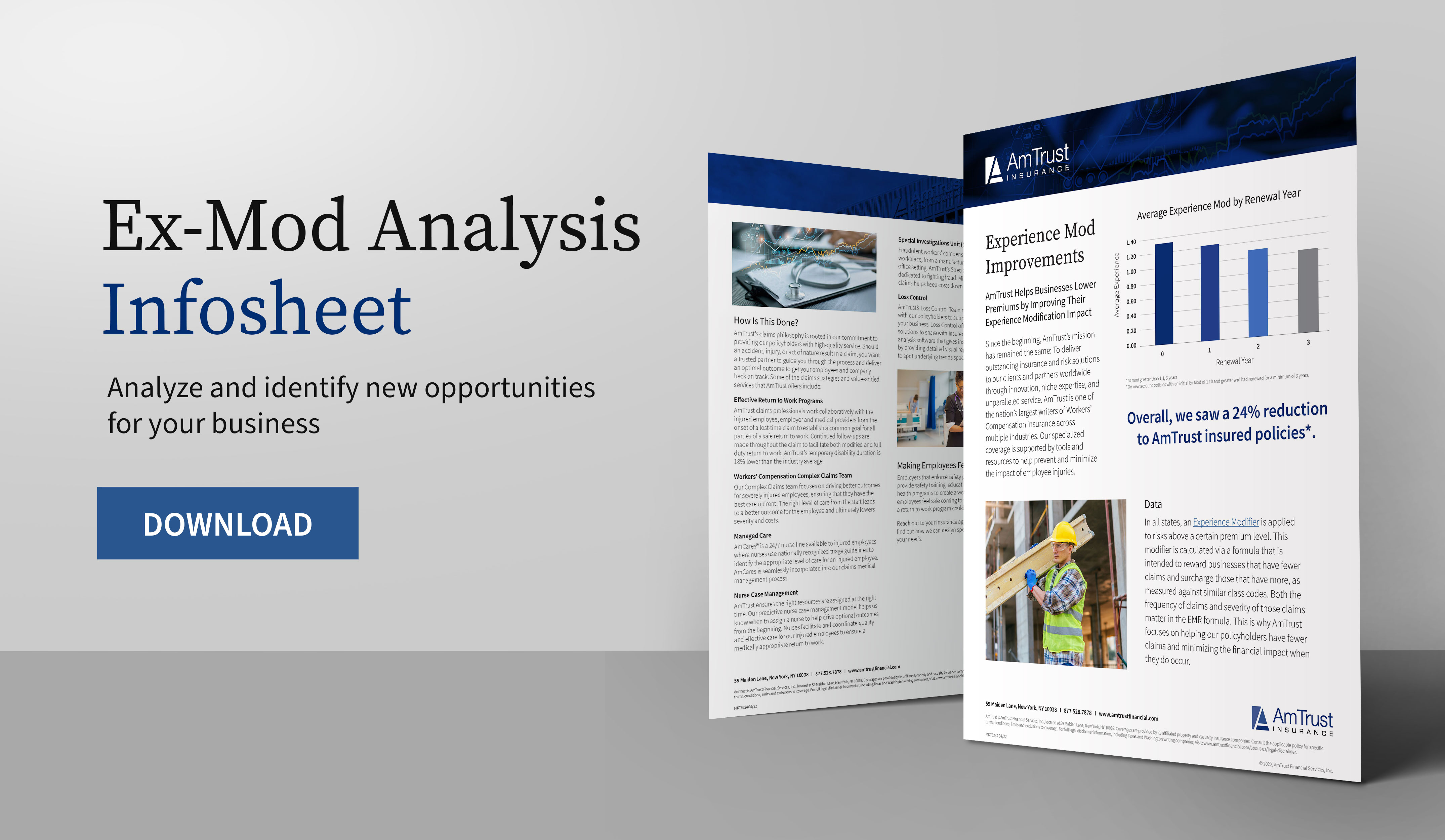How Experience Modification Rate Impacts Workers’ Comp Premiums
Businesses who have safe workplaces could see an experience modifier, the connection between their workplace injury loss and workers’ comp costs, that is better than average. Insurance companies use the experience modifiers to help determine workers’ compensation premium costs, and companies with lower risk will generally have a lower premium.

The experience modifier is a multiplying factor that’s assigned to a company by the state that they operate in and reflects its claim history. Just as a credit score qualifies how you interact with debt, the experience mod or x-mod measures a company’s work-related accidents. If their accident history is below average, the business can get a credit on its workers’ compensation policy, meaning it pays less premium. If its experience is above average when compared to similar sized and types of companies, it will pay more than average for the same type of coverage.
What is Experience Modification Rate (EMR)?
Insurance companies translate the experience modifier into a number, or an experience modification rate (EMR). This number is based on your company’s historical cost of injuries and future risk chances. A company’s EMR is then compared to the average losses of other employers in your state in the same industry. The final
rate is based on a presumption that historical losses predict future losses. An EMR of 1.0 is the industry average. If your business has a lower EMR, then your workers’ compensation will be lower. If the EMR is above 1.0, then premium rates will be higher.
How is Experience Modification Rate Calculated?
The
EMR is calculated by dividing a company’s payroll by classification by 100 and then by a “class rate” determined by the National Council on Compensation Insurance (NCCI) reflecting the classification’s potential risk factor. The
NCCI calculations cover businesses in 39 out of 50 states. If a company is in one of the other 11 states, an independent agency determines the EMR. If a business operates in two or more NCCI states, an interstate modifier will be determined.

To get the final rate number, an insurance company will look at how your company compares to other businesses in the same industry. An
experience rating is based on the three years prior to the most recent expired policy period. New companies will automatically start with a 1.0 EMR. The rate stays with a company for three years.
The EMR also looks at the number of claims that a company has filed. More claims could lead to a higher EMR rate. “For example, three claims in three years that total $20,000 will generally have a greater negative impact against the experience mod than one $20,000 claim over the same period. Workplace incidents can have a much greater negative effect on a smaller company than on a larger one, and a single lapse in safety that results in injury can lead to higher premiums,” Wilkins said.
How Can Small Businesses Impact Their Workers' Compensation Experience Modification Rate?
A company that has an effective workplace safety program in place can help lower their EMR rate.
Workplace safety programs help to eliminate workplace hazards and reduce employee injuries and accidents.
The Occupational Safety and Health Administration (OSHA) shows that employers who establish employee safety programs can reduce costs related to injury and workplace illness by up to 40%. Businesses who implement a
return to work program could also see their EMR reduced.
Employers that enforce safety procedures and regulations provide safety training, education and occupational health programs to
create a workplace environment in which employees feel safe coming to work. When employees feel safe on the job, it helps boost their loyalty to the organization, too.
Workers’ Compensation Insurance from AmTrust
AmTrust is a leader in
workers’ compensation insurance for small to mid-sized businesses. Reach out to your insurance agent or
contact us today to find out how we can design specific insurance packages to fit your needs.
 This material is for informational purposes only and is not legal or business advice. Neither AmTrust Financial Services, Inc. nor any of its subsidiaries or affiliates represents or warrants that the information contained herein is appropriate or suitable for any specific business or legal purpose. Readers seeking resolution of specific questions should consult their business and/or legal advisors. Coverages may vary by location. Contact your local RSM for more information.
This material is for informational purposes only and is not legal or business advice. Neither AmTrust Financial Services, Inc. nor any of its subsidiaries or affiliates represents or warrants that the information contained herein is appropriate or suitable for any specific business or legal purpose. Readers seeking resolution of specific questions should consult their business and/or legal advisors. Coverages may vary by location. Contact your local RSM for more information.